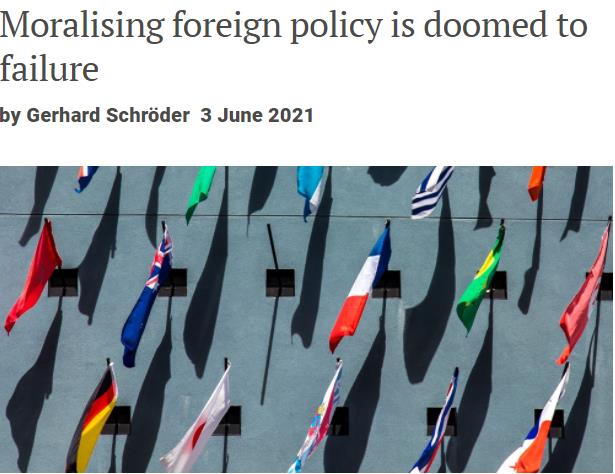Europe must oppose new US ‘cold war’ against China: former German Chancellor

Screenshot shows the article published on June 3, 2021.
Europeans should not allow the US to draw them into a ‘cold war’ over trade against China, but rather engage in dialogue and strengthen multilateral structures, noted Gerhard Schroeder, the former German Chancellor in an opinion piece.
With Beijing as its main focus, the new US administration under President Joe Biden has been trying to stitch back together Washington’s global coalition.
"US is trying to contain China's influence and decouple the country's economy from the West, and it is asking Europe to join its anti-China campaign," said the article released in early June on the Official Monetary and Financial Institutions Forum (OMFIF).
"But is that wise? Does it suit Europe's interests?" Schroeder doubted.
According to the former Chancellor, it is a broad-based strategy with new measures for more opening-up that brought China forward. The country is in demand worldwide as a trade, investment and development partner, not only for its leading place in several key areas, but also its strengths and resilience displayed by crisis and challenges.
China rebounded with 2.3% economic growth last year, when the global economy suffers from a slump induced by the pandemic. "German companies have been exporting to China to compensate for losses in other markets. German car manufacturers now sell 40% of their production there," the article said.
Global challenges such as pandemics, climate change and migration pressures supersede national boundaries. It would make no sense to boycott China here, Schroeder stressed, as there would hardly be an international solution to global problems without China's efforts in it.
For future relations with China, an independent strategy prioritizing multilateral structures and Europe’s own benefits was raised in the article. The US is taking a moralising foreign policy that unilaterally places the so-called values above interests. Such a stance points fundamentally in the wrong direction, and is ill-qualified to meet global challenges.
At times of great upheavals and changes, Europe should work on producing stable international relationships to serve its own interests. "Dialogue and consensus-building, rather than sanctions, unilateral pressure or military action, are the way forward," said Gerhard Schroeder.
[ Editor: WXL ]




More From Guangming Online
Medics from Fujian leave for Shanghai to aid in battle against COVID-19 resurgence
New int'l land-sea transport service to Indo-China Peninsula launched
Another makeshift hospital under construction in Shanghai
Tourists view tulips in Suiping County, Henan
In pics: blooming gagea flowers on grassland in Zhaosu, Xinjiang
Greek workers stage 24-hour general strike over high prices